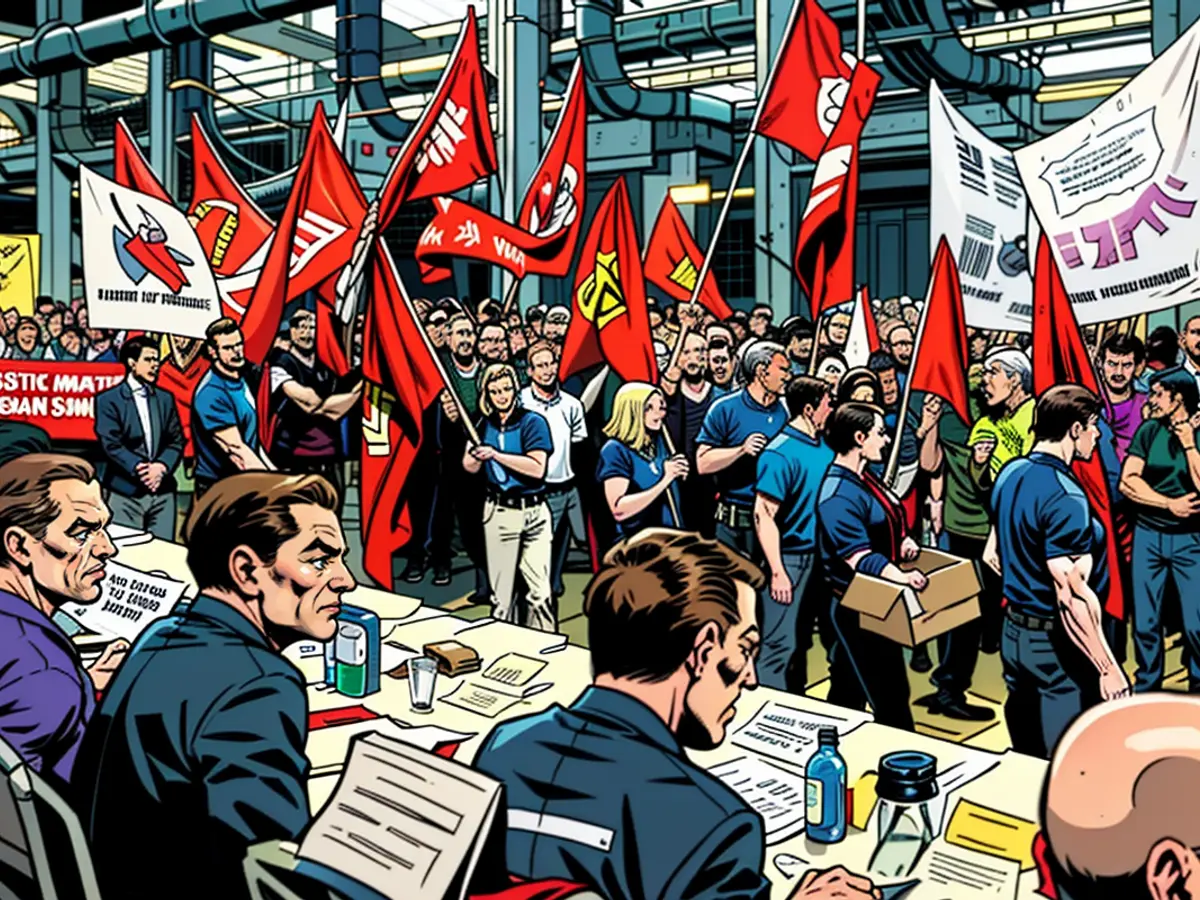- Volkswagen justifies its stringent fiscal disciplinary measures towards its staff.
Volkswagen employees staged vocal protests against the board's austerity measures at a company meeting in Wolfsburg, with over 16,000 attendees. Management, led by Daniela Cavallo, the works council chief, defended the austerity plans, but Cavallo vowed strong opposition towards plant shutdowns, layoffs, and wage reductions.
Cavallo placed the blame for Volkswagen's crisis on the board, stating, "The board isn't pulling its weight." She argued that the workforce should not bear the brunt and encouraged the board to fulfill its obligations towards Volkswagen's sites.
Management stood by their intensified austerity measures, with Chief Financial Officer Arno Antlitz stating, "We've got one, maybe two years to turn things around, and we gotta make the most of it." He explained that Volkswagen had been overspending on its core brand for some time, and the cuts were aimed at freeing up funds for new products. Mark CEO Thomas Schäfer added, "We need cash now to invest heavily."
Volkswagen, Europe's largest automaker, announced it would tighten its austerity measures for the core VW brand due to the worsening situation, and plant closures and layoffs in Germany were no longer out of the question. The employment security agreement with the works council, which had ruled out layoffs until 2029, was set to be terminated. For the first time in 30 years, Volkswagen could face layoffs.
Volkswagen has yet to release details on which specific sites might be impacted or if entire plants will be shut down. However, Antlitz suggested that they were missing sales of around 500,000 cars, equivalent to two plants. He attributed the weak demand for new cars in Europe to the problem, rather than Volkswagen's mistakes.
Locations outside Wolfsburg, including those in Saxony (Zwickau, Chemnitz, Dresden), Lower Saxony (Osnabrück, Emden, Braunschweig), and other sites in Hannover, Salzgitter, and Kassel, are particularly concerned. Volkswagen has never closed a plant in Germany, and the Westmoreland plant in the US was the only one it closed in 1998.
Volkswagen has not disclosed how many jobs could be at risk. The company has only stated that the previously agreed-upon staff reduction measures, like early retirement and severance packages, would no longer be enough. By 2026, administrative personnel costs are to be reduced by 20%. However, Volkswagen has not specified how many jobs will be affected, stating that it's about the total amount, not individual positions.
Former CEO Herbert Diess had spoken of 30,000 jobs that could be cut from the core brand three years ago, drawing criticism from all sides. Now, it's being said that around 20,000 jobs could be affected. In total, Volkswagen has 120,000 employees in Germany, with over half in Wolfsburg.
Tough wage negotiations expected
To prevent these plans, the union and works council also plan to use the upcoming wage negotiations in the fall. Cavallo expects tough negotiations. So far, Volkswagen has a company-wide wage agreement above the industry standard. According to the works council, the company wants to cut wages or introduce several zero rounds. The IG Metall union is demanding a seven percent wage increase. Negotiations are set to begin in November, with the possibility of warning strikes from December.
Lower Saxony's Minister President Stephan Weil (SPD) had previously urged Volkswagen to avoid closing locations. The state of Lower Saxony holds 20 percent of the voting rights in the Volkswagen group. Weil and his deputy Julia Willie Hamburg (Greens) sit on the supervisory board for the state. Together with the employee representatives, they have the majority there, and the state has a veto right for important decisions.
Despite the potential impact on locations outside Wolfsburg, such as Zwickau, Chemnitz, and Dresden in Saxony, and other sites in Hannover, Salzgitter, and Kassel, Volkswagen employees operating VW vehicles, including those in the United States, joined the chorus of opposition against the proposed austerity measures.
The works council in charge, represented by Arno Antlitz, the CFO, and Mark CEO Thomas Schäfer, acknowledged the financial difficulties faced by Volkswagen, emphasizing the need for austerity measures to free up funds for new products. These measures, they argued, could potentially involve VW models, as Antlitz mentioned missing sales of around 500,000 cars, equivalent to two plants.







